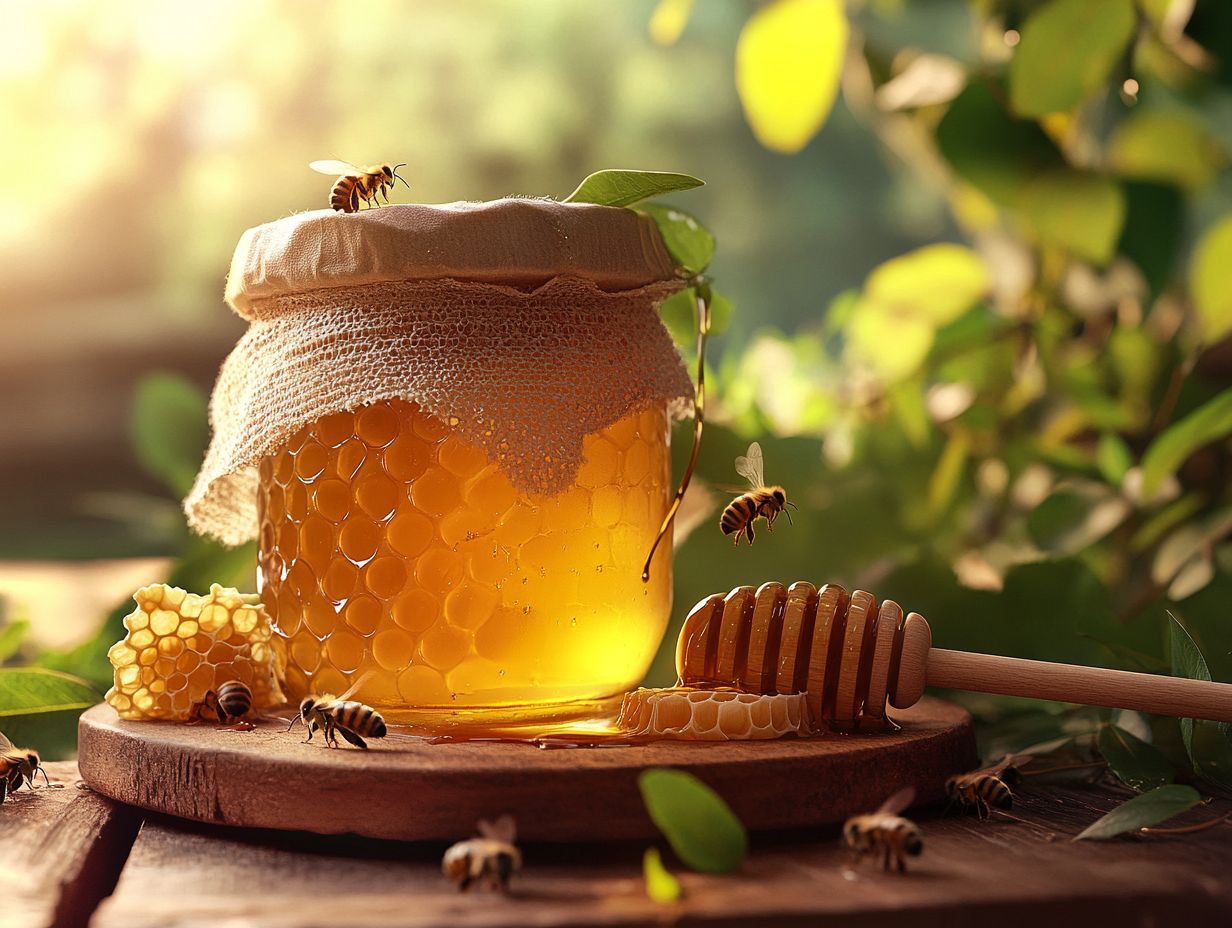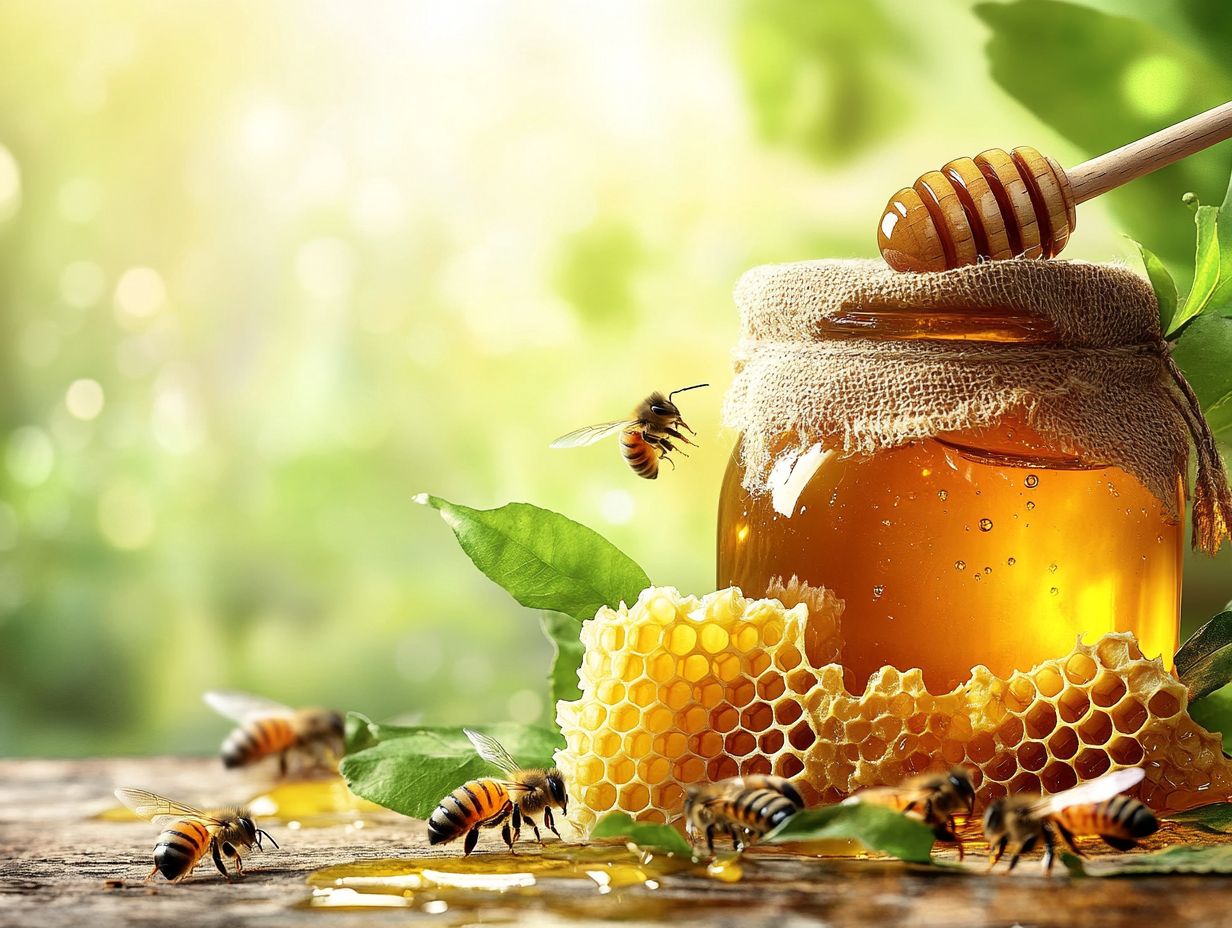The Health Benefits of Honey: What Science Says
Honey transcends being merely a sweetener; it is a veritable powerhouse of health benefits. Supported by scientific evidence from institutions like the World Health Organization and the Cleveland Clinic, honey offers a multitude of advantages that can significantly elevate your well-being.
From promoting wound healing to soothing sore throats and enhancing your immune system, honey consumption is recommended in moderation to reap these benefits without adverse effects. Don’t miss out on the incredible health benefits of honey; start adding it to your diet today!
Delve into the remarkable health benefits of honey, uncover simple ways to incorporate it into your daily diet, and explore the various types available to you, such as raw honey, manuka honey, and crystallized honey.
Make sure to stock up on this natural powerhouse in your pantry!
Contents
Key Takeaways:

- Get ready to discover the amazing health benefits of honey! It includes wound healing, boosting the immune system, and relieving cough and cold symptoms. Its healing properties are often attributed to the natural enzymes and antioxidants in honey.
- Incorporating honey into your diet is easy and versatile. You can use it as a natural sweetener, in homemade dressings, baked goods, and hot beverages. Products like whipped honey and filtered honey offer even more culinary possibilities.
- There are various types of honey, with raw, manuka, crystallized, and buckwheat honey being some of the most popular options, each with their own unique properties and benefits. Different types of honey, like Tupelo honey, Sourwood honey, and acacia honey, also offer distinct flavors and advantages.
What are the Health Benefits of Honey?
Honey, often celebrated as a natural sweetener, offers a remarkable array of health benefits that enhance your overall wellness. Its consumption is associated with a variety of health benefits, thanks to the rich profile of antioxidants like flavonoids and polyphenols nestled within its viscous texture.
Research has revealed that honey possesses anti-inflammatory properties, which can assist in alleviating certain health conditions while promoting your general well-being. Many health enthusiasts, including experts like Beth Czerwony from the Cleveland Clinic, advocate for incorporating honey into a balanced diet, highlighting its ability to deliver essential nutrients without the downsides of more processed sugars.
From wound healing to bolstering your immune system, the advantages of honey consumption are both plentiful and impressive.
1. Helps with Wound Healing
Raw honey has long been celebrated as a traditional remedy for wound healing, a testament to its natural healing properties bestowed by honeybees. The American Academy of Pediatrics, however, warns about the risk of infant botulism from honey that may contain bacteria that can cause illness in infants.
The remarkable effectiveness of raw honey stems from its intricate composition, which encompasses natural sugars, enzymes, antioxidants, and a host of phytonutrients. Together, these elements work in harmony to create an environment inhospitable to harmful bacteria.
Numerous studies have highlighted its potent antibacterial properties, showing efficacy against a variety of pathogens, including the notoriously resilient MRSA. Honey also retains moisture, creating an ideal healing environment for tissue regeneration.
Honeycomb, with its elaborate structure, further enhances the healing process by acting as a physical barrier that shields wounds from external contaminants. Different types of honey, such as Manuka and Leptospermum, are particularly renowned for their amplified therapeutic benefits, offering differing levels of antibacterial effects that contribute significantly to effective wound care.
2. Soothes Sore Throats
Honey, especially when enjoyed in warm beverages, is celebrated for its soothing effects on sore throats. It offers the relief you often seek during those chilly seasons.
The natural sweetness of honey delights your taste buds and envelops you in a comforting sensation that can alleviate throat irritation. As a revered natural sugar, it shines in home remedies, skillfully masking the bitterness of various medicinal ingredients.
Research shows that honey boasts antimicrobial properties, providing a valuable ally in combating infections that lead to discomfort. Varieties like manuka honey are particularly noteworthy for their enhanced antibacterial effects, making them especially effective at soothing throat pain and promoting healing.
By incorporating honey into your warm teas or lemon drinks, you can transform your next beverage into a therapeutic elixir, perfect for those pesky lingering coughs and sore throats! Try adding honey to your tea today and feel the difference!
3. Boosts Immune System
The rich array of antioxidants in honey, including flavonoids and polyphenols, plays a significant role in boosting your immune system and fending off infections.
These natural compounds are crucial for neutralizing harmful free radicals that can lead to oxidative stress and a decline in your overall health if left unchecked. Research consistently shows that individuals who include honey in their diets enjoy a strengthened immune response.
For instance, studies reveal that regular honey consumption enhances the production of certain immune cells, like cytokines a type of protein that helps regulate the immune response and T-lymphocytes, promoting a more robust defense against pathogens.
Particular varieties of honey, like manuka, exhibit unique properties linked to increased antimicrobial activity. This underscores the idea that honey is not merely a delicious sweetener but also a powerful ally in maintaining your immune health.
4. Relieves Cough and Cold Symptoms
Honey is celebrated as a natural cough remedy, delivering effective relief from cough and cold symptoms for both children and adults.
Numerous clinical studies have shown just how effective honey can be in alleviating cough symptoms, often outperforming conventional treatments you might typically reach for. Certain varieties, such as manuka honey, packed with unique compounds, can significantly reduce the severity and frequency of coughs due to their soothing properties.
Unlike processed honey, which often lacks beneficial nutrients, raw honey retains its natural enzymes and antioxidants, making it the superior choice for cough relief. If you re grappling with persistent coughs, incorporating these specific types can enhance your comfort and support your overall health!
5. Acts as a Natural Energy Source
Honey is renowned as a natural energy source, primarily due to its composition of glucose and fructose. This delightful nectar offers you quick energy without the dreaded crash that often accompanies processed sugars.
This unique blend makes honey especially attractive if you’re looking to enhance your physical performance. It boosts your endurance and helps maintain your energy levels during demanding activities.
Many athletes incorporate honey into their pre-workout snacks or post-exercise recovery meals, enjoying its rapid yet sustained source of fuel. You’ll find that a variety of health foods now showcase honey as a star ingredient, tapping into its natural sweetness and energy-boosting benefits.
As researchers delve deeper into its effects, it becomes increasingly evident that this golden substance is more than just a delicious addition to your meals; it acts as a functional food that supports both your performance and recovery!
6. Aids in Digestion

Consuming raw honey may significantly enhance your digestion thanks to its natural enzymes that help break down food and promote gut health.
This delightful sweetener elevates the flavor of various dishes and acts as a powerful ally for anyone experiencing digestive discomfort.
Research indicates that the prebiotics in raw honey nourish beneficial gut bacteria, improving the overall balance of your gut flora.
Certain varieties, such as Manuka honey, have garnered attention for their unique qualities, including antimicrobial effects and the potential to soothe an inflamed digestive tract.
By incorporating raw honey into your diet, you might experience less bloating, better nutrient absorption, and a more resilient digestive system. This highlights honey’s status as a valuable natural remedy for common digestive issues.
7. Contains Antioxidants
Honey is packed with antioxidants, which are essential for fighting cell damage and reducing the risk of chronic diseases.
These natural compounds work hard to neutralize harmful free radicals in your body, enhancing your overall health and wellbeing.
Research shows that adding honey to your daily routine can strengthen your immune system, improve heart health, and even aid in weight management.
The antioxidants in honey also contribute to skin health, protecting against aging and damage.
By weaving honey into your diet, you can enjoy these remarkable benefits, promoting longevity and fostering a resilient body better equipped to fend off age-related deterioration and disease.
8. May Improve Heart Health
Emerging research suggests that honey could enhance your heart health by positively influencing cholesterol levels and lowering blood pressure.
This captivating area of study shows how honey’s natural properties, especially its antioxidant content, can contribute to cardiovascular wellness.
Products like mad honey, although rare, are studied for their unique impact on heart health.
Notably, recent findings reveal a clear distinction between raw and processed honey, showing that raw honey retains higher levels of beneficial compounds that may further support your heart’s function.
Certain studies indicate that consuming raw honey can result in more significant reductions in bad cholesterol levels compared to processed honey.
The anti-inflammatory properties found in unprocessed honey might also help reduce the risk of heart disease, making it a potentially valuable addition to your heart-healthy diet.
9. May Help with Allergies
Discover how local honey can be your amazing secret weapon against seasonal allergies. It contains trace amounts of pollen that may help build your immunity to allergens.
By regularly adding local honey to your diet, you’re introducing small doses of pollen to your system, which can lead to gradual desensitization.
This mirrors the principles of immunotherapy, where controlled exposure to allergens strengthens your immune response over time.
Numerous studies suggest that individuals who include local honey in their diets often report fewer allergy symptoms, likely due to this very mechanism.
Furthermore, the antioxidants and natural properties in honey may boost your body s defenses against allergic reactions, promoting your overall well-being during challenging allergy seasons.
How to Incorporate Honey into Your Diet
Incorporating honey into your diet offers a delightful way to enjoy its many health benefits. It serves as a natural sweetener and a versatile ingredient that can enhance a wide range of dishes.
Enjoy the sweetness, but remember to savor it in moderation for the best benefits. Like other sweeteners, excessive use can impact your health.
1. As a Natural Sweetener
Using honey as a natural sweetener is a delightful and effective way to elevate both the flavor profile and health benefits of your meals.
According to dietitian Beth Czerwony from the Cleveland Clinic, honey is a healthier alternative to liquid sugar.
By incorporating honey, you can significantly reduce your reliance on refined sugars. These sugars are notorious for offering empty calories devoid of nutritional value.
Honey not only imparts a rich and distinctive flavor but also features a wealth of antioxidants and vitamins that contribute to your overall well-being.
It seamlessly enhances a variety of dishes whether you re drizzling it over oatmeal or yogurt, stirring it into salad dressings for an unexpected touch of sweetness, or incorporating it into marinades for meats to achieve a perfect balance of savory flavors.
In the world of baking, honey truly shines; it infuses moisture into cakes and cookies while delivering a deeper and more complex sweetness than its processed counterparts.
2. In Homemade Salad Dressings
You can elevate your homemade salad dressings by adding honey, which provides a delightful sweetness that beautifully balances tangy and savory flavors.
Incorporating honey into your dressings enhances the overall taste and offers a natural alternative to refined sugars.
This makes your meal more nutritious.
Its unique properties work wonders to emulsify oil and vinegar, ensuring a smooth, cohesive blend that clings perfectly to your fresh greens and vegetables.
With a plethora of recipes at your fingertips, from honey mustard vinaigrette to citrus-honey variations, you can explore a range of flavor profiles with ease.
This approach to using honey encourages a commitment to healthier eating by transforming salads into distinctive and irresistible dishes, ultimately inspiring you to include more vegetables in your diet.
3. In Baked Goods

Some studies, including those from the World Health Organization, warn about the implications of excessive sugar intake, which can lead to metabolic syndrome.
Therefore, using honey as a more natural sweetener can be beneficial.
Try adding honey to your baked goods for a delicious treat!
It not only elevates their sweetness but also introduces unique flavors and health benefits that processed sugars simply can’t match.
This natural sweetener serves as a fantastic alternative, infusing a rich, aromatic quality into everything from muffins to cakes.
When you use honey in moderation, you gain access to a treasure trove of vitamins, minerals, and antioxidants that can enhance your overall well-being.
Its natural humectant properties work wonders, helping to retain moisture in your baked treats and resulting in a tender crumb that stays fresh longer.
Whether you re drizzling it into a loaf recipe or mixing it into cookie dough, honey has the power to transform ordinary treats into extraordinary delights.
It’s not just about taste; it’s also a smarter choice for those who are health-conscious and want to indulge without compromise.
4. In Hot Beverages
Don t miss out on the soothing benefits of honey during cold season!
Adding honey to your hot beverages is a delightful way to embrace its soothing properties, especially during those chilly seasons when coughs and colds seem to be lurking around every corner.
Not only does honey elevate the flavor profile of your favorite drinks, but it also serves as a natural remedy that can ease throat irritation.
Imagine pairing honey with a warm cup of chamomile tea, famous for its calming effects, or stirring it into a zesty lemonade that invigorates your senses while providing a refreshing dose of vitamin C.
Herbal teas, such as ginger or peppermint, gain an extra layer of appeal with honey s natural sweetness.
These drinks become not just enjoyable but also beneficial in relieving those pesky coughs and colds.
The viscous texture of honey coats your throat, alleviating discomfort and delivering a touch of nature s goodness with every sip.
What are the Different Types of Honey?
You will find an impressive array of honey varieties, each distinguished by its unique flavor, color, and health benefits.
This diversity makes honey an exceptionally versatile ingredient in cooking.
Try different types of honey and discover the unique flavors they bring to your dishes! Check your local market for a variety of options.
1. Raw Honey
Raw honey is celebrated for its rich nutrient content and many health benefits. It is often regarded as the purest form of honey because it remains unprocessed.
This amazing honey is packed with enzymes, antioxidants, and essential vitamins that boost your overall well-being. Unlike processed honey, raw honey retains its natural flavors and nutrients for a wholesome experience.
The honeycomb itself plays a vital role in its production, offering a natural habitat for bees while enhancing the honey’s texture and taste. The beeswax in honeycomb adds health benefits, including antimicrobial properties, further enriching the advantages of opting for raw honey over its processed counterpart.
2. Manuka Honey
Manuka honey, sourced from the nectar of the manuka tree, is celebrated for its exceptional healing properties and many health benefits. However, it is essential to note that raw honey, including Manuka, should not be given to infants under one year due to the risk of Clostridium botulinum contamination, as stated by the American Academy of Pediatrics.
This remarkable substance, born from the blossoms of Leptospermum scoparium, has garnered significant attention for its potent antibacterial effects, primarily due to its high concentrations of methylglyoxal (MGO). Research indicates that manuka honey can effectively inhibit the growth of various pathogenic bacteria, making it a favored option in alternative medicine for wound care and infection prevention.
A study published in the Journal of Applied Microbiology revealed that manuka honey significantly reduced the presence of resistant bacterial strains, highlighting its potential as a natural therapeutic agent.
Along with its antibacterial prowess, manuka honey is also lauded for its anti-inflammatory properties, which can help soothe sore throats and alleviate digestive issues. This solidifies its reputation as a holistic remedy.
3. Buckwheat Honey
Buckwheat honey stands out for its impressive antioxidant content, making it a favored choice among those who prioritize health in their dietary selections. This dark, robust honey enchants your palate with its rich, earthy flavor while presenting a unique blend of floral notes that differentiates it from lighter honey varieties.
Its bold, slightly malty taste enriches a variety of culinary experiences, whether you re drizzling it over pancakes or using it as a natural sweetener in teas and desserts. Beyond its delightful flavor profile, buckwheat honey is brimming with potent antioxidants like phenolic compounds, which help combat oxidative stress and bolster the immune system.
Regularly including this honey in your diet may also enhance circulation, reinforcing its status as a functional food worth savoring.
4. Clover Honey
Clover honey stands out as one of the most widely available types of honey, cherished for its mild flavor and versatility as a natural sweetener. This beautiful golden nectar is created by bees that primarily gather nectar from clover blossoms, making it a staple in countless kitchens and recipes.
Its gentle, floral notes render it an ideal ingredient for sweetening tea, enhancing baked goods, or even drizzling over yogurt and pancakes. Clover honey is recognized for its potential health benefits, including antimicrobial properties and antioxidants that contribute to your overall wellness.
Many individuals, including experts like Beth Czerwony from the Cleveland Clinic, opt for it not just for its flavor but also as a healthier alternative to refined sugars, making it a beloved staple in households that seek a more natural approach to sweetening.
Discover the unique flavors of each honey and elevate your health today!
5. Acacia Honey

Acacia honey has a light hue and delicate floral notes. It is a delightful choice for anyone seeking a subtle natural sweetener.
Other varieties like Tupelo honey and Sourwood honey also offer unique flavors and health benefits. This exquisite variety originates from the blossoms of the black locust tree, enchanting your palate with its mild sweetness.
It is perfect for drizzling over yogurt or blending into smoothies, elevating your culinary creations.
What sets acacia honey apart is its low glycemic index, which means it raises blood sugar levels slowly. This makes it a great option for those watching their sugar intake.
Its soothing properties and rich antioxidant content provide numerous health benefits, catering to diverse dietary preferences such as vegan, paleo, and gluten-free lifestyles. The World Health Organization even acknowledges the benefits of choosing natural sweeteners over processed ones.
With its delightful flavor and health benefits, acacia honey is rapidly becoming a must-have in kitchens everywhere!
Frequently Asked Questions
What are the health benefits of honey?
Honey has been used for centuries as a natural remedy for various ailments. It contains antioxidants and has antibacterial properties, making it a popular choice for boosting overall health and treating minor health issues.
What makes honey beneficial for health?
The main component of honey that makes it beneficial for health is its high concentration of antioxidants. These compounds help protect the body from damage caused by free radicals, reducing the risk of chronic diseases.
Can honey help with allergies?
According to experts from the Cleveland Clinic, some studies suggest that consuming local raw honey may help reduce allergy symptoms. Bees collect pollen from local plants, and consuming honey made from this pollen can help desensitize the body to allergens.
Is honey a healthier alternative to sugar?
Honey is often touted as a healthier alternative to sugar due to its lower glycemic index and the presence of antioxidants. However, it is still high in calories and should be consumed in moderation.
Are all types of honey equally beneficial?
Not all types of honey are created equal. Raw and unfiltered honey is considered to be the most beneficial as it retains its natural enzymes and antioxidants. Processed honey may have lower levels of these compounds.
Can honey be used topically for health benefits?
Honey has been used topically for centuries to treat wounds and skin infections due to its antibacterial properties. It is effective against bacteria such as Clostridium botulinum. Some studies also suggest that it may have anti-inflammatory and moisturizing effects, making it a natural remedy for skin issues.
The American Academy of Pediatrics advises caution with honey for children under one year due to the risk of botulism.
Discover the sweet benefits of acacia honey today and elevate your health naturally!


